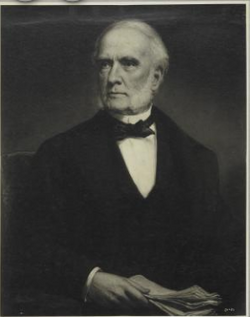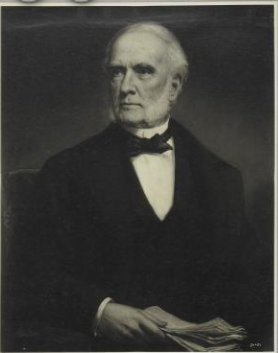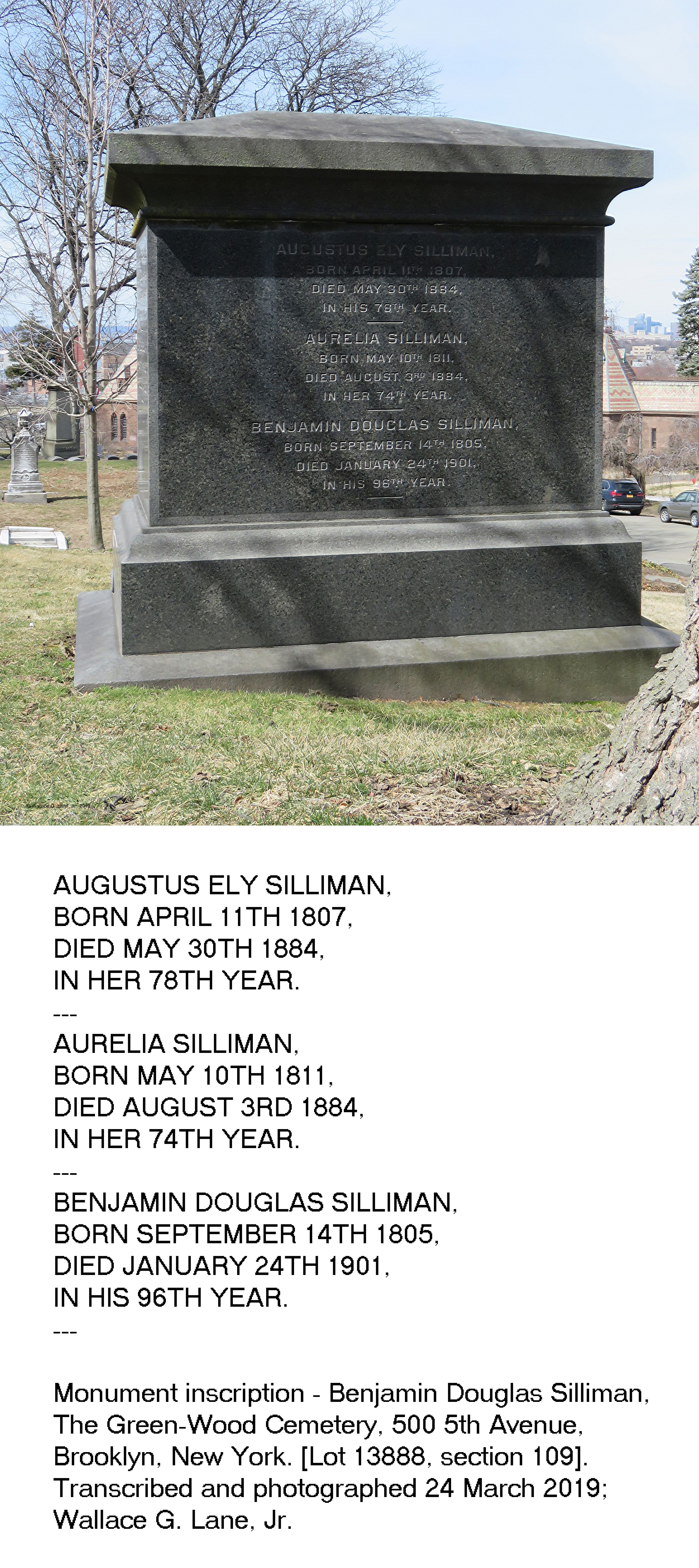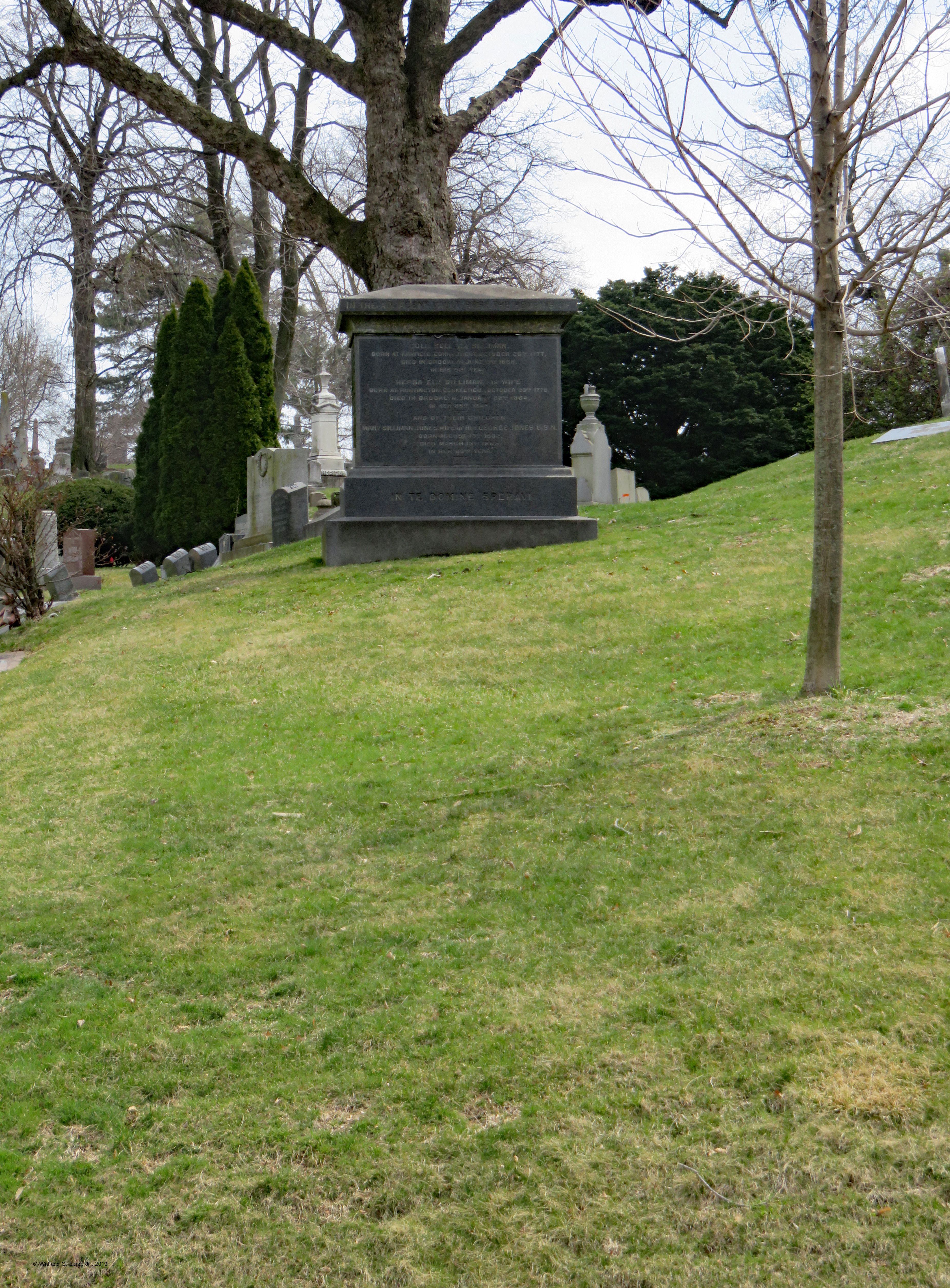He was the son of Gold Selleck Silliman (Yale 1796), grandson of General Gold Selleck Silliman (Yale 1752), who was distinguished in colonial times as King's Attorney for Fairfield County and during the Revolution for vigilant and patriotic service in behalf of freedom, and great-grandson of Judge Ebenezer Silliman (Yale 1727).
At the close of the War of 1812 his father gave up his successful law practice in Newport and engaged in business in New York City, removing to Brooklyn in 1823, where he lived to the age of 90 years, dying in 1868, and where his son thereafter resided.
For a year after graduation Mr. Silliman was at Yale as Assistant in Chemistry, under his uncle, Professor Benjamin Silliman (Yale 1796), and then studied law in New York City, in the boffice of Chancellor Kent (Yale 1781) and his son (afterward Judge) William Kent, and was admitted to the bar in May, 1829. With the exception of a few interruptions for public service he continued in the active practice of his profession for over 71 years. The sixtieth anniversary of his admission to practice was
observed by a dinner given him by leading members of the bar in 1889.
For over half a century Mr. Silliman was counsel of the Union Ferry Company, of the National Bank of Commerce of Brooklyn, and of Greenwood Cemetery in Brooklyn.
In 1838 he was a representative in the New York Legislature, in 1839 a member of the national convention at Harrisburg which nominated the first General Harrison for the Presidency. In 1865-66, by appointment of President Lincoln, he was U. S. Attorney for the Eastern District of New York, and in 1872 was chosen a member of the commission to revise the State constitution. In 1842 he was nominated by the Whigs of the Second District for Congressman, but was defeated by a small majority, and in 1873 was the Republican candidate for Attorney General of the State.
He was one of the founders of the Bar Association of New York City, and at one time Vice President. He served most acceptably as President of the New England Society of Brooklyn for six years from its incorporation in 1880. He was a director of the Long Island Historical Society in Brooklyn, member of the Board of Managers of the House of Refuge for Juvenile Delinquents in New York for many years, and identified with the
management of other associations.
He was honored with the degree of LL.D. from Columbia University in 1873, and from Yale University in 1874.
His health of body and vigor of mind were preserved in unusual degree to the close of his long life, and his social and cheerful disposition, unfailing affability and courtesy, and kindness of heart, made bis companionship a delight to those privileged to share it.
Mr. Silliman died of bronchial pneumonia, after an illness of a
week at his home in Brooklyn, on January 24, 1901, at the age of
95 years and four months. He was never married. He left a
generous bequest to the University, in addition to a fund which
was given in trust to him for Yale by his brother.
He was the son of Gold Selleck Silliman (Yale 1796), grandson of General Gold Selleck Silliman (Yale 1752), who was distinguished in colonial times as King's Attorney for Fairfield County and during the Revolution for vigilant and patriotic service in behalf of freedom, and great-grandson of Judge Ebenezer Silliman (Yale 1727).
At the close of the War of 1812 his father gave up his successful law practice in Newport and engaged in business in New York City, removing to Brooklyn in 1823, where he lived to the age of 90 years, dying in 1868, and where his son thereafter resided.
For a year after graduation Mr. Silliman was at Yale as Assistant in Chemistry, under his uncle, Professor Benjamin Silliman (Yale 1796), and then studied law in New York City, in the boffice of Chancellor Kent (Yale 1781) and his son (afterward Judge) William Kent, and was admitted to the bar in May, 1829. With the exception of a few interruptions for public service he continued in the active practice of his profession for over 71 years. The sixtieth anniversary of his admission to practice was
observed by a dinner given him by leading members of the bar in 1889.
For over half a century Mr. Silliman was counsel of the Union Ferry Company, of the National Bank of Commerce of Brooklyn, and of Greenwood Cemetery in Brooklyn.
In 1838 he was a representative in the New York Legislature, in 1839 a member of the national convention at Harrisburg which nominated the first General Harrison for the Presidency. In 1865-66, by appointment of President Lincoln, he was U. S. Attorney for the Eastern District of New York, and in 1872 was chosen a member of the commission to revise the State constitution. In 1842 he was nominated by the Whigs of the Second District for Congressman, but was defeated by a small majority, and in 1873 was the Republican candidate for Attorney General of the State.
He was one of the founders of the Bar Association of New York City, and at one time Vice President. He served most acceptably as President of the New England Society of Brooklyn for six years from its incorporation in 1880. He was a director of the Long Island Historical Society in Brooklyn, member of the Board of Managers of the House of Refuge for Juvenile Delinquents in New York for many years, and identified with the
management of other associations.
He was honored with the degree of LL.D. from Columbia University in 1873, and from Yale University in 1874.
His health of body and vigor of mind were preserved in unusual degree to the close of his long life, and his social and cheerful disposition, unfailing affability and courtesy, and kindness of heart, made bis companionship a delight to those privileged to share it.
Mr. Silliman died of bronchial pneumonia, after an illness of a
week at his home in Brooklyn, on January 24, 1901, at the age of
95 years and four months. He was never married. He left a
generous bequest to the University, in addition to a fund which
was given in trust to him for Yale by his brother.
Family Members
Sponsored by Ancestry
Advertisement
Advertisement
















